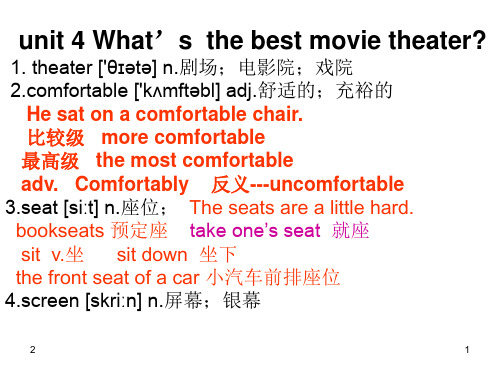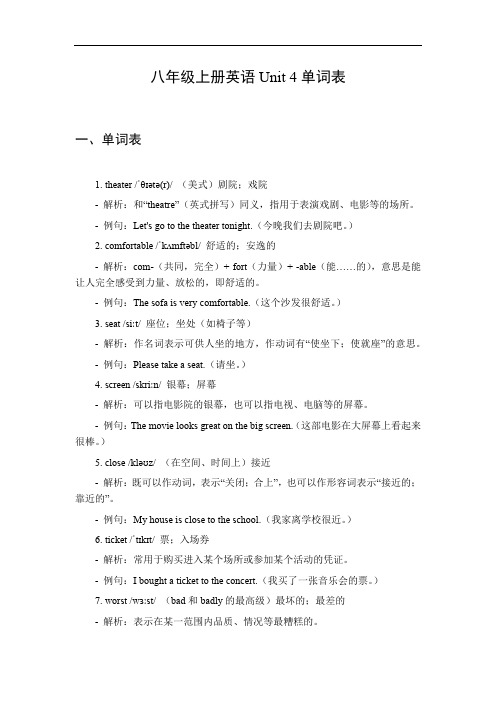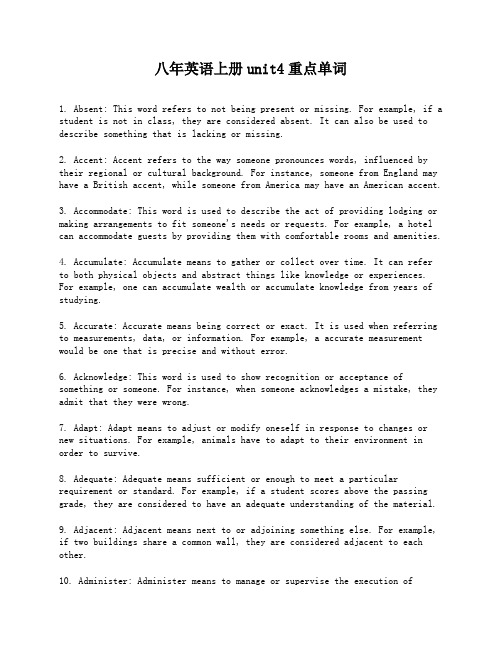最新八年级英语上册Unit4单词
初中英语 人教版八年级上册Unit4 What's the best movie theater 单词讲解(共13张PPT)

create v. 创作;创造
24.performer [pə‘fɔːmə(r)] n.表演者;执行者;演员
• perform v.执行;表演 perform the roles of women.
2020/8/7
4
17.worse [wɜːs] adj.更坏的;更差的
18.service ['sɜːvɪs] n.服务
• They provide thebest service in town.
• serve /sɜːv/v. 招待、为…服务 、
• serve sb. 为某人服务
• Serve the people 为人民服务
• carelessly adv.疏忽地
• You didn’t do your homework ____ ,Tom. I’msorry. But I don’t have_____ for such things.
• ·A.careful enough; enough time
• ·B.enough careful; time enough
• ·C.carefully enough; enough time
• ·D.enough carefully; enough time
13.reporter [rɪ'pɔːtə(r)] n.记者
14.so far 到目前为止;迄今为止
15.fresh [freʃ] adj.新鲜的;清新的
fortably ['kʌmftəbli] adv.舒服地;容易地;充裕地
8.cheaply ['tʃiːpli] adv.廉价地;粗俗地
• She is lucky to buy the house so cheaply. • 东西有贵贱,价格有高低 • 修饰词price (high, low ) thing (expensive, cheap )
八年级上册英语unit4单词

八年级上册英语Unit 4单词表一、单词表1. theater /ˈθɪətə(r)/ (美式)剧院;戏院-解析:和“theatre”(英式拼写)同义,指用于表演戏剧、电影等的场所。
-例句:Let's go to the theater tonight.(今晚我们去剧院吧。
)2. comfortable /ˈkʌmftəbl/ 舒适的;安逸的-解析:com-(共同,完全)+ fort(力量)+ -able(能……的),意思是能让人完全感受到力量、放松的,即舒适的。
-例句:The sofa is very comfortable.(这个沙发很舒适。
)3. seat /siːt/ 座位;坐处(如椅子等)-解析:作名词表示可供人坐的地方,作动词有“使坐下;使就座”的意思。
-例句:Please take a seat.(请坐。
)4. screen /skriːn/ 银幕;屏幕-解析:可以指电影院的银幕,也可以指电视、电脑等的屏幕。
-例句:The movie looks great on the big screen.(这部电影在大屏幕上看起来很棒。
)5. close /kləʊz/ (在空间、时间上)接近-解析:既可以作动词,表示“关闭;合上”,也可以作形容词表示“接近的;靠近的”。
-例句:My house is close to the school.(我家离学校很近。
)6. ticket /ˈtɪkɪt/ 票;入场券-解析:常用于购买进入某个场所或参加某个活动的凭证。
-例句:I bought a ticket to the concert.(我买了一张音乐会的票。
)7. worst /wɜːst/ (bad和badly的最高级)最坏的;最差的-解析:表示在某一范围内品质、情况等最糟糕的。
-例句:This is the worst movie I've ever seen.(这是我看过的最差的电影。
unit4八年级上册英语单词

unit4八年级上册英语单词一、theater(theatre) ['θɪətə(r)] n. 剧场;电影院;戏院。
1. comfortable ['kʌmftəbl] adj. 使人舒服的;舒适的。
2. seat [siːt] n. 座位;坐处(如椅子等)3. screen [skriːn] n. 银幕;屏幕。
4. close [kləʊs] v. (在空间、时间上)接近。
5. ticket ['tɪkɪt] n. 票;入场券。
6. worst [wɜːst] adj. & adv. (bad和badly的最高级) 最差(的);最坏(的);最糟(的)7. cheaply ['tʃiːpli] adv. 便宜地;低廉地。
8. song [sɒŋ] n. 歌;歌曲。
9. choose [tʃuːz] v. (chose [tʃəʊz]) 选择;挑选。
10. carefully ['keəfəli] adv. 细致地;小心地;谨慎地。
11. reporter [rɪ'pɔːtə(r)] n. 记者。
12. fresh [freʃ] adj. 新鲜的;清新的。
13. comfortably ['kʌmftəbli] adv. 舒服地;舒适地。
14. worse [wɜːs] adj. & adv. (bad和badly的比较级) 更差(的);更坏(的);更糟(的)15. service ['sɜːvɪs] n. 接待;服务。
16. pretty ['prɪti] adv. 相当;十分;很 adj. 漂亮的。
17. menu ['menjuː] n. 菜单。
18. act [ækt] v. 扮演;表演者n. 行为;动作。
19. meal [miːl] n. 早(或午、晚)餐;一餐所吃的食物。
20. creative [kri'eɪtɪv] adj. 有创造力的;创造性的。
八年级英语上册1-4单元单词

八年级英语上册1-4单元单词Unit 1.1. anyone [ˈeniwʌn] pron. 任何人。
2. anywhere [ˈeniweə(r)] adv. 任何地方。
3. wonderful [ˈwʌndəfl] adj. 精彩的;绝妙的。
4. few [fjuː] adj. & pron. 不多;很少。
5. most [məʊst] adj.,adv. & pron. 最多;大多数。
6. something [ˈsʌmθɪŋ] pron. 某事;某物。
7. nothing [ˈnʌθɪŋ] pron. 没有什么;没有一件东西。
8. everyone [ˈevriwʌn] pron. 每人;人人;所有人。
9. myself [maɪˈself] pron. 我自己;我本人。
10. yourself [jɔːˈself] pron. 你自己;您自己。
11. hen [hen] n. 母鸡。
12. pig [pɪɡ] n. 猪。
13. seem [siːm] v. 好像;似乎;看来。
14. bored [bɔːd] adj. 厌倦的;烦闷的。
15. someone [ˈsʌmwʌn] pron. 某人。
16. diary [ˈdaɪəri] n. 日记;记事簿。
17. enjoyable [ɪnˈdʒɔɪəbl] adj. 有乐趣的;令人愉快的。
18. activity [ækˈtɪvəti] n. 活动。
19. decide [dɪˈsaɪd] v. 决定;选定。
20. try [traɪ] v. & n. 尝试;设法;努力。
21. paragliding [ˈpærəɡlaɪdɪŋ] n. 滑翔伞运动。
22. feel like [fiːl laɪk] 给……的感觉;感受到。
23. bird [bɜːd] n. 鸟。
24. bicycle [ˈbaɪsɪkl] n. 自行车;脚踏车。
八年级英语上册单词表4

八年级英语上册单词表4 Unit 4 第四单元单词和表达式1.take.搭乘(某种交通工具) v2.subway.地铁;地下火车n3.walk走;步行;散步v.4.hey.(用以促使注意,表示惊异或询问)嘿;喂int5.train.火车n6.forty四十num.7.fifty五十num.8.sixty.六十num9.seventy.七十num10.eighty八十num.11.ninety九十num.12.hundred.一百num13.minute.分钟n14.take花费(时间) v.15.by.表示交通、传递等的方式rep16.by bus 乘坐公共汽车17.far远的;遥远的adj.18.how far多远19.kilometer公里;千米n.20.shower&n.淋浴v.21.quick快的;迅速的adj.22.bicycle.自行车;两轮脚踏车n23.station.车站n24.early.早的;提早的adje.英里n26.stop.车站n27.transportation运送;运输28.northn.北部的;北方的29.North America北美洲30.part地区;区域n.31.thing事物;事情n.32.other另外的;其他的adj.33.depend.依赖;依靠v34.depend on视……而定;决定于35.river.河;江n36.boat.船n37.by boat乘坐小船38.must (表示推测)一定v.39.than.(用于形容词、副词的比较级之后)比conj40.more (用于构成部分形容词及副词的比较级)(比……)更;更多的;更大的adv.41.means方法;手段;工具n.42.car小汽车n.43.town.镇;城镇n44.ill生病的;不健康的adj.45.worry担心;担忧;焦虑v.46.look at朝……看47.so.(表示程度)这么;那么adv48.much十分;非常adv.。
八年英语上册unit4重点单词

八年英语上册unit4重点单词1. Absent: This word refers to not being present or missing. For example, if a student is not in class, they are considered absent. It can also be used to describe something that is lacking or missing.2. Accent: Accent refers to the way someone pronounces words, influenced by their regional or cultural background. For instance, someone from England may have a British accent, while someone from America may have an American accent.3. Accommodate: This word is used to describe the act of providing lodging or making arrangements to fit someone's needs or requests. For example, a hotel can accommodate guests by providing them with comfortable rooms and amenities.4. Accumulate: Accumulate means to gather or collect over time. It can refer to both physical objects and abstract things like knowledge or experiences. For example, one can accumulate wealth or accumulate knowledge from years of studying.5. Accurate: Accurate means being correct or exact. It is used when referring to measurements, data, or information. For example, a accurate measurement would be one that is precise and without error.6. Acknowledge: This word is used to show recognition or acceptance of something or someone. For instance, when someone acknowledges a mistake, they admit that they were wrong.7. Adapt: Adapt means to adjust or modify oneself in response to changes or new situations. For example, animals have to adapt to their environment in order to survive.8. Adequate: Adequate means sufficient or enough to meet a particular requirement or standard. For example, if a student scores above the passing grade, they are considered to have an adequate understanding of the material.9. Adjacent: Adjacent means next to or adjoining something else. For example, if two buildings share a common wall, they are considered adjacent to each other.10. Administer: Administer means to manage or supervise the execution ofsomething. For example, a teacher will administer a test or a doctor may administer medication.11. Adolescent: Adolescent refers to the period of life between childhood and adulthood, typically during the teenage years. It is a time of physical and emotional changes as individuals transition into adulthood.12. Advise: Advise means to offer suggestions or recommendations to someone. People often seek advice from professionals, such as doctors or lawyers.13. Aggressive: Aggressive refers to behavior that is assertive, forceful, or hostile. It often implies a readiness to engage in conflict or confrontation.14. Agitate: Agitate means to provoke or disturb someone's emotions ormentally upset them. For example, a protest can agitate a government.15. Aid: Aid refers to providing assistance or support to someone or something. It can be in the form of physical help or financial assistance.16. Allegiance: Allegiance refers to loyalty or commitment to a person, group, or cause. For example, citizens pledge allegiance to their country.17. Alter: Alter means to change or modify something. It can refer to physical or non-physical changes. For example, altering a dress or altering one's plan.18. Ambition: Ambition refers to a strong desire or determination to achieve something great. It is often associated with setting goals and working hard to accomplish them.19. Amuse: Amuse means to entertain or provide enjoyment. For example,watching a funny movie can amuse someone.20. Analyze: Analyze means to examine or study something in detail to understand its composition, structure, or nature. This can be done using various methods, such as observations, experiments, or research.21. Anchor: Anchor refers to a heavy object used to prevent a ship or boatfrom drifting away. It can also be used metaphorically to describe something that provides stability or support.22. Ancestor: An ancestor is a person from whom one is descended. They aretypically someone who lived in the past and is a part of one's family history.23. Ancient: Ancient refers to something that is very old or from a long time ago. It is often used to describe civilizations or artifacts that existed in the distant past.24. Animated: Animated means full of life, energy, or excitement. It can also refer to something that is brought to life through animation or cartoon.25. Annual: Annual means occurring once a year. It is often used to describe events or activities that happen on a yearly basis.26. Anticipate: Anticipate means to expect or look forward to something happening in the future. For example, a student may anticipate the start of summer vacation.27. Antonym: An antonym is a word that has the opposite meaning of another word. For example, "hot" and "cold" are antonyms.28. Apparent: Apparent means easily seen, understood, or recognized. It can also refer to something that is obvious or clearly true.29. Approach: Approach means to move towards or come closer to something or someone. It can also be used to describe a method or way of doing something.30. Arrogant: Arrogant refers to someone who is overly proud or has an exaggerated sense of self-importance. It often involves looking down on others and belittling them.31. Ascertain: Ascertain means to find out for certain, to determine or establish something accurately. For example, during an investigation, one may need to ascertain the facts.32. Assemble: Assemble means to come together or gather in one place. For instance, people may assemble for a meeting or a protest.33. Assistance: Assistance is help given to someone, either in the form of aid or support. For example, a friend may offer assistance during a difficult time.34. Assign: Assign means to give someone a task, job, or responsibility. For instance, a teacher may assign students with writing assignments.35. Associate: Associate means to connect or link someone or something with another person or thing. For example, people often associate certain smells with specific memories.36. Attach: Attach means to fasten or connect something to another thing. For example, you can attach files to an email before sending it.37. Attain: Attain means to achieve or reach a goal, usually after a period of effort or struggle. For example, students may work hard to attain good grades.38. Attitude: Attitude refers to a person's feelings or opinions about something or someone. It can influence one's behavior and decisions.39. Attract: Attract means to draw attention or interest, often towards something appealing or interesting. For example, a beautiful painting can attract viewers.40. Audience: Audience refers to the group of people who listen to or watch a performance, speech, or presentation.41. Author: An author is a person who writes a book, story, poem, or other piece of literature.42. Automobile: An automobile is a vehicle used for transporting people and goods, typically powered by an engine.43. Avoid: Avoid means to prevent something from happening or to keep away from something dangerous or unpleasant.44. Await: Await means to wait for something to happen, often something thatis expected or planned.45. Awareness: Awareness refers to the state of being conscious of something. It can involve understanding and recognizing a particular situation or issue.46. Balance: Balance refers to an even distribution of weight enabling someone or something to remain upright and steady.47. Ban: A ban is an official or legal prohibition against something, such as certain substances or activities.48. Barrier: A barrier is something that prevents progress, communication, or understanding between people or groups.49. Beam: A beam is a long, strong piece of wood or metal, used to support weight or as a lever.50. Bear: Bear can refer to a large, strong, typically omnivorous mammal or to carry or provide support for something.。
八年级上册英语单词表第4单元
八年级上册英语单词表第4单元人教版八年级上册英语单词表(Unit 4)一、单词。
1. theater /'θɪətə(r)/ n. 剧场;电影院;戏院。
2. comfortable /'kʌmftəbl/ adj. 使人舒服的;舒适的。
3. seat /siːt/ n. 座位;坐处(如椅子等)4. screen /skriːn/ n. 银幕;屏幕。
5. close /kləʊs/ v. (在空间、时间上)接近。
6. ticket /'tɪkɪt/ n. 票;入场券。
7. worst /wɜːst/ adj. & adv. (bad和badly的最高级)最差(的);最坏(的);最糟(的)8. cheaply /'tʃiːpli/ adv. 便宜地;低廉地。
9. song /sɒŋ/ n. 歌;歌曲。
10. choose /tʃuːz/ v. (chose /tʃəʊz/)选择;挑选。
11. carefully /'keəfəli/ adv. 细致地;小心地;谨慎地。
12. reporter /rɪ'pɔːtə(r)/ n. 记者。
13. fresh /freʃ/ adj. 新鲜的;清新的。
14. comfortably /'kʌmftəbli/ adv. 舒服地;舒适地。
15. worse /wɜːs/ adj. & adv. (bad和badly的比较级)更差(的);更坏(的);更糟(的)16. service /'sɜːvɪs/ n. 接待;服务。
17. pretty /'prɪti/ adv. 相当;十分;很 adj. 漂亮的。
18. menu /'menjuː/ n. 菜单。
19. act /ækt/ v. 扮演;表演者 n. 行为;行动。
20. meal /miːl/ n. 早(或午、晚)餐;一餐所吃的食物。
八年级上册英语单词 (4)
八年级上册英语单词本文档整理了八年级上册英语教材中出现的一些重要单词,可以帮助同学们更好地备考和记忆单词。
以下是按照教材单元划分的各个单词列表。
Unit 1: Hello!•hello 你好•hi 嗨•good morning 早上好•good afternoon 下午好•good evening 晚上好•goodbye 再见•see you later 再见•see you tomorrow 明天见•how are you? 你好吗?•I’m fine, thank you. 我很好,谢谢你。
•what’s your name? 你叫什么名字?•my name is… 我叫…•nice to meet you 很高兴见到你•where are you from? 你来自哪里?•I’m from… 我来自…Unit 2: My Family•family 家庭•father 父亲•mother 母亲•parents 父母•brother 兄弟•sister 姐妹•grandfather 外祖父•grandmother 外祖母•uncle 叔叔•aunt 阿姨•cousin 堂兄弟/堂姐妹•child 孩子•children 孩子们Unit 3: My School•school 学校•classroom 教室•teacher 老师•student 学生•desk 课桌•chair 椅子•blackboard 黑板•chalk 黑板粉笔•textbook 教科书•pen 笔•pencil 铅笔•notebook 笔记本•bag 书包•library 图书馆•playground 操场Unit 4: My Hobbies•hobby 爱好•read 读书•swim 游泳•draw 画画•dance 跳舞•sing 唱歌•play basketball 打篮球•play soccer 踢足球•play the guitar 弹吉他•play the piano 弹钢琴•play chess 下棋Unit 5: Food and Drinks •food 食物•drink 饮料•breakfast 早餐•lunch 午餐•dinner 晚餐•rice 米饭•noodles 面条•bread 面包•milk 牛奶•tea 茶•coffee 咖啡•water 水•juice 果汁•vegetable 蔬菜•fruit 水果Unit 6: My Day•day 天•morning 早上•afternoon 下午•evening 晚上•night 夜晚•wake up 醒来•get up 起床•brush teeth 刷牙•have breakfast 吃早餐•go to school 去学校•have lunch 吃午饭•go home 回家•have dinner 吃晚饭•go to bed 上床睡觉Unit 7: My Friends•friend 朋友•classmate 同学•boy 男孩•girl 女孩•tall 高的•short 矮的•thin 瘦的•fat 胖的•kind 友好的•funny 有趣的•shy 害羞的•outgoing 外向的•smart 聪明的•honest 诚实的•hard-working 努力工作的Unit 8: My Home•home 家•living room 客厅•bedroom 卧室•kitchen 厨房•bathroom 浴室•dining room 餐厅•garden 花园•sofa 沙发•table 桌子•chair 椅子•bed 床•closet 衣柜•shower 淋浴•mirror 镜子•window 窗户Unit 9: My Country•country 国家•China 中国•America 美国•Japan 日本•Germany 德国•France 法国•Australia 澳大利亚•India 印度•Korea 韩国•Russia 俄罗斯•language 语言•flag 旗帜•capital 首都•population 人口•famous 著名的以上是本文档整理的八年级上册英语教材中的一些重要单词。
人教版八年级上册英语单词表:Unit4
人教版八年级上册英语单词表:Unit4Unit4Unit4What's the best movie theater?theater ['胃瑟蓹t蓹] n.鍓у満;鐢靛奖闄?鎴忛櫌comfortable ['k蕦mft蓹bl] adj.鑸掗€傜殑;?seat [si藧t] n.搴т綅;screen [skri藧n] n.灞忓箷;閾跺箷close [kl蓹蕣s] v.鍏?鍚堟嫝;涓嶅紑鏀?鍋滀笟worst [w蓽藧st] adj.鏈€鍧忕殑;cheaply ['t蕛i藧pli] adv.寤変环鍦?绮椾織鍦?song [s蓲艐] n.姝屾洸;姝屽敱choose [t蕛u藧z] v.閫夋嫨;鍐冲畾carefully ['ke蓹f蓹li] adv.灏忓績鍦帮紝璁ょ湡鍦?reporter [r瑟'p蓴藧t蓹(r)] n.璁拌€?fresh [fre蕛] adj.鏂伴矞鐨?娓呮柊鐨?comfortably ['k蕦mft蓹bli] adv.鑸掓湇鍦?瀹规槗鍦?? worse [w蓽藧s] adj.鏇村潖鐨?鏇村樊鐨?service ['s蓽藧v瑟s] n.鏈嶅姟pretty ['pr瑟ti] adv.鐩稿綋鍦癮dj.婕備寒鐨?menu ['menju藧] n.鑿滃崟act [忙kt] v.琛屽姩;琛ㄦ紨meal [mi藧l] n.涓€椁?so far鍒扮洰鍓嶄负姝?no problem娌′粈涔??creative [kri'e瑟t瑟v] adj.鍒涢€犵殑锛屽垱閫犳€х殑; performer [p蓹'f蓴藧m蓹(r)] n.琛ㄦ紨鑰?鎵ц? talent ['t忙l蓹nt] n.澶╄祴;鎵嶈兘锛屾墠鑹?common ['k蓲m蓹n] adj.?鍏卞悓鐨? magician [m蓹'd蕭瑟蕛n] n.榄旀湳甯?beautifully ['bju藧t瑟fli] adv.缇庝附鍦?瀹岀編鍦?role [r蓹蕣l] n.浣滅敤;瑙掕壊winner ['w瑟n蓹(r)] n.鑾疯儨鑰?prize [pra瑟z] n.濂栧搧;濂栭噾everybody ['evrib蓲di] pron.姣忎汉;浜轰汉example [瑟锟斤拷'z锟斤拷藧mpl] n.渚嬪瓙;姒滄牱poor [p蓴藧(r)] adj.;?seriously ['s瑟蓹ri蓹sli] 涓ラ噸鍦帮紝涓ヨ們鍦?give [锟斤拷瑟v] v.缁?璧犱簣;閫?crowded ['kra蕣d瑟d] adj.鎷ユ尋鐨?have n common鏈夌浉鍚岀壒寰?all kinds of;be up to?鐨勮亴璐?鐢扁€︹€?鍐冲畾play a role鍙戞尌浣滅敤;鏈夊奖鍝?makeup缂栭€?for example渚嬪take eriously璁ょ湡瀵瑰緟。
八上英语第四单元单词
八上英语第四单元单词英文回答:Unit 4: Technology in Our Daily Lives.Vocabulary.devise: to create or plan something, especially an invention.gadget: a small device, especially an electronic one, with a specific function.appliance: a machine that performs a particular task in the home, such as a washing machine or refrigerator.tool: an implement used to perform a task, especially one that is held in the hand.device: a machine or instrument used for a particularpurpose, especially one that is portable.panel: a flat piece of material, typically rectangular, used for a variety of purposes, such as a control panel ora display.screen: a surface on which images or data are displayed, typically in a computer or television.keyboard: a set of keys used to input data or commands into a computer.mouse: a small, handheld device used to control the cursor on a computer screen.speaker: a device that produces sound, especially in a radio or television.microphone: a device that converts sound waves into electrical signals, used for recording or transmitting sound.headphones: a pair of small speakers that are wornover the ears to listen to sound.remote control: a device used to control a televisionor other electronic device from a distance.software: a set of instructions that tells a computer what to do.中文回答:第四单元,科技在我们的日常生活中。
